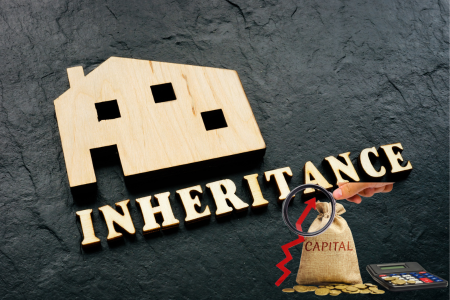
Inheriting a house in Stockton can be an emotional experience. However, it can also come with some financial obligations, including capital gains taxes and inheritance tax. If you’re not careful, these taxes can take a significant chunk of your inheritance.
In this blog, we will cover everything you need to know about inherited house capital gains and how to avoid paying them. From determining the capital gains tax on inherited property to understanding adjusted cost basis (ACB) and step-up in basis, we’ve got you covered. We will also discuss the various ways in which you can avoid paying capital gains taxes, such as converting the inherited property into a rental property or deducting selling expenses. So, whether you’re planning to sell the house or hold onto it for rental income, read on for expert tips on avoiding inherited house capital gains.

What are Inherited House Capital Gains?

When you sell the home that you inherit, the profit made from it is known as inherited house capital gains. It is calculated by taking the difference between the sale price and the original purchase price. In some cases, such gains can lead to significant tax liabilities. However, there are ways to minimize or even avoid these taxes through strategies like establishing a stepped-up basis or utilizing a trust.
A stepped-up basis means that the value of the property is deemed to be its fair market value at the time of inheritance, rather than its original purchase price. This helps reduce the amount of capital gains tax you owe when you sell the property.
Another strategy is to use a trust to transfer ownership of the property. By doing so, you may be able to avoid or reduce estate taxes and also minimize capital gains tax.
It is important to note that each situation is unique, and consulting with a financial advisor or tax professional can help you determine the best course of action for your specific circumstances. Taking proactive steps before selling an inherited property can save you a substantial amount of money in taxes in the long run.
How to Determine the Capital Gains Tax on Inherited Property

When it comes to calculating capital gains tax on inherited property, there are a few key factors to consider. First, you’ll need to determine the property’s basis, which includes the purchase price plus any improvements made over time. You’ll also need to determine the fair market property value at the time of the previous owner’s death.
Once you have these values, you can calculate the adjusted cost basis (ACB) by subtracting them from the sale price. Depending on your specific circumstances, you may be eligible for certain deductions or exclusions that can help minimize your fee bill.
It’s important to note that navigating capital gains tax on inherited property can be complex, so it’s wise to seek guidance from a financial advisor who specializes in this area. With their help, you can ensure that you’re taking advantage of all available tax-saving strategies and minimizing your liability.
How to Calculate Adjusted Cost Basis (ACB)

When calculating the capital gains tax on an inherited house, the Adjusted Cost Basis (ACB) is a crucial factor. ACB enables you to compute your taxable income for capital gains tax purposes by reducing the excess value of the property’s tax basis from its current market value at the date of death. It is essential to consider any improvements made over time and other expenses like legal fees or repair costs for rental properties while computing ACB. Maintaining good financial records is vital to ensure accurate data for computing ACB with the guidance of a financial advisor or IRS experts. By doing so, you can effectively reduce your taxable income and lower your inherited house capital gains fee bill.
What is a Step-Up in Basis?

When you inherit assets, their value is adjusted to their current market value for levy purposes, which is known as a step-up in basis. This adjustment implies that if you sell the asset, you won’t have to pay capital gains taxes on the appreciated value. It’s a crucial tax benefit that can help reduce or eliminate taxes due on inherited assets. The step-up in basis rule applies to most assets, including real estate, stocks, bonds, and mutual funds. However, certain types of assets such as retirement accounts and annuities may not qualify for a step-up in basis. Additionally, it’s important to note that the step-up in basis only applies when you inherit an asset; if you gift an asset during your lifetime, the recipient would receive your original cost basis instead of a stepped-up one.
What are the Tax Rates for Capital Gains on Inherited Property?

When it comes to capital gains on inherited house, the tax rates differ depending on the asset’s value and duration of ownership. If the property is sold within a year, short-term tax rates apply, while long-term rates are lower if it’s sold after a year. The exact rates that apply to your circumstances can be determined by seeking advice from a tax professional. It’s crucial to have a clear understanding of these tax implications to make informed decisions about selling or holding onto the inherited home. Additionally, there may be certain exemptions or deductions available that can help reduce your tax liability, so it’s important to explore all options before making any decisions.
5 Ways to Avoid Capital Gains Taxes on Inherited Property
If you’re looking for ways to avoid paying capital gains taxes on an inherited house, there are several expert tips that can help reduce the taxable gain on the inherited property. For example, one option is to hold onto the house for at least a year before selling it. This can qualify you for long-term capital gains tax rates and lower your overall tax bill. Another way is to utilize step-up in basis rules, which adjust the value of the property’s tax basis upon inheritance and can reduce or even eliminate your capital gains taxes. Additionally, exploring tax-deferred exchange options such as a 1031 exchange or gifting/donating the house can also help avoid capital gains taxes entirely. Ultimately, consulting with a financial advisor or tax professional can provide valuable insight into these and other strategies specific to your situation.

When to Sell Inherited Property
To avoid facing substantial tax consequences, especially those related to inherited house capital gains, it is crucial to sell an inherited home at the right time. Before making any decisions, homeowners need to consider several factors. Firstly, they should evaluate current market values and how they align with their overall financial situation. Secondly, they must weigh potential capital gains and losses against tax implications from selling either now or later. It is advisable to keep emotions in check by considering retaining the house as a rental or primary residence instead of hastily selling after inheriting. Lastly, consulting with a financial advisor or tax professional is imperative to understand the tax implications associated with selling an inherited property and make well-informed decisions based on their unique circumstances. By taking all these factors into account, homeowners can sell their inherited home without incurring significant tax consequences and maximize their inheritance.
How to Deduct Selling Expenses
Inherited property can lead to significant taxable gains, but there are ways to reduce them. One such way is by deducting selling expenses like real estate agent commissions and advertising costs from the taxable gain. It is essential to maintain accurate records to ensure the deductions are valid. Hiring a tax professional can be beneficial in navigating the complex regulations of inherited house capital gains.
There are also exclusions and exemptions that can be considered to lower taxable gain, such as the primary residence exemption or step-up in basis rule. The primary residence exemption allows homeowners to exclude up to $250,000 of capital gains from the sale of a primary residence ($500,000 if married filing jointly), while the step-up in basis rule allows for a new cost basis equal to the fair market value at the time of inheritance. Careful consideration of these options and consultation with a tax professional can help minimize taxable gain on inherited property.
How to Convert Inherited Property into a Rental Property

When transforming an inherited property into a rental property, it is crucial to take into account the tax implications to prevent any legal repercussions. The first step involves assessing the rental market in the locality to establish its viability. It is advisable to enlist the services of a trustworthy property management firm for tenant screening, rent collection, and upkeep. Additionally, it would be advantageous to seek guidance from a competent financial advisor or tax expert as they can assist you in navigating intricate tax regulations with proficiency.
When to Consult a Financial Advisor
Inheriting a property can come with potential tax consequences, making it crucial to seek guidance from a financial advisor. With their assistance, you can understand the various options available to minimize or avoid taxes associated with inherited property and manage your assets effectively. Financial advisors can also help you set up trusts or incorporate properties into estate planning strategies for long-term benefits.
It’s important to note that the tax consequences of inheriting a property depend on several factors such as the value of the property, how it was acquired, and whether it was sold or kept. The tax implications may be different if the property is inherited through a will or trust. For instance, if the property is sold soon after inheritance, there may be capital gains taxes to consider.
A financial advisor can help you determine the best course of action based on your unique situation and goals. They can assist in creating a comprehensive plan that considers all aspects of your finances and helps you make informed decisions about managing your inherited assets. By seeking expert advice, you can ensure that your inherited property is managed efficiently and in accordance with your wishes.
Key Take Aways

When you inherit a property, it’s important to consider the potential tax implications, such as owing capital gains and being subject to capital gains taxes. Depending on your tax bracket and the value of the property you inherited, you may owe taxes on the appreciation of the property over time. Calculating your capital gains and understanding how they are taxed can help you determine your tax liability. If you decide to sell the property, you would owe capital gains tax on the difference between the sale price and the adjusted cost basis. However, there are ways to reduce or avoid these taxes, such as holding onto the property for a longer period to qualify for more favorable tax rates. Additionally, you could explore options like converting the property into a rental, which may allow you to deduct expenses and offset your capital gains tax. It’s important to consult with tax professionals to ensure you understand the tax rules and make informed decisions to minimize your capital gains tax liability. Remember, each situation is unique, so it’s crucial to consider all applicable tax laws and regulations when dealing with inherited property or any other form of inherited assets, including cash or real estate.
How long should I wait before selling an investment property before I can claim capital gains on my taxes?
To claim long-term capital gains taxes, you must keep the investment property for at least one year. If you sell before this period, you’ll be subject to short-term capital gains taxes. However, it’s best to consult a tax advisor to understand the specific rules and regulations in your area.
The Bottom Line
Inheriting a property in Stockton can be an exciting and rewarding experience, but it’s essential to be aware of the potential tax implications, such as the obligation to pay capital gains taxes on the inherited house. The good news is that there are several strategies available to help you minimize or even eliminate these taxes, and we’re here to guide you through them.
One key strategy is to understand the concept of “step-up in basis.” When you inherit a property, the tax basis is adjusted to its fair market value at the time of inheritance. This adjustment can work in your favor because it means that when you sell the property, you’ll only be taxed on the appreciation that occurs after you inherit it, rather than the entire value from the time it was originally purchased. This can significantly reduce your potential tax liability.
Calculating the adjusted cost basis of the property is also important. By considering factors such as improvements made to the property, allowable deductions, and other expenses, you can accurately determine the capital gains and potential tax owed. This can make a significant difference in reducing your tax burden.
Exploring alternatives to selling the inherited property right away can be another effective way to manage capital gains taxes. For example, you may consider converting the property into a rental, which can generate rental income and allow you to claim depreciation expenses. By holding onto the property for a longer period, you may also qualify for more favorable long-term capital gains tax rates.
It’s important to understand the intricacies of tax rules and the types of taxes involved. Familiarize yourself with how the IRS applies tax laws, particularly in regards to capital gains taxes on inherited properties. It’s worth noting that federal inheritance taxes have mostly been eliminated, but some states may still have their own estate tax laws to consider.
To navigate these complex tax matters, we encourage you to seek guidance from a financial advisor who specializes in taxation. They can provide personalized advice based on your specific circumstances, ensuring that you make informed decisions about your inherited property. Additionally, consulting with an estate attorney who is well-versed in estate law can provide you with valuable insights and help you fully understand all possible implications.
Remember, you don’t have to face these tax challenges alone. With the right support and knowledge, you can minimize or even eliminate the tax burden on inherited property, allowing you to make the most of your inheritance. We’re here to help you every step of the way.
Unlock the Value of Your Inherited House: Sell with Ease to Click Cash Home Buyers!
Maximize Your Inheritance Now! Sell Your Inherited House to Click Cash Home Buyers and Enjoy a Stress-Free Experience. Get a Fair Cash Offer, Swift Closing, and Relish the Freedom to Move On. Don’t Wait, Take Control of Your Future Today!


Contact Us
We would love to hear from you! Please fill out this form and we will get in touch with you shortly.

